110 Search Results for rating scale
September 23, 2014
by Carole Zangari -
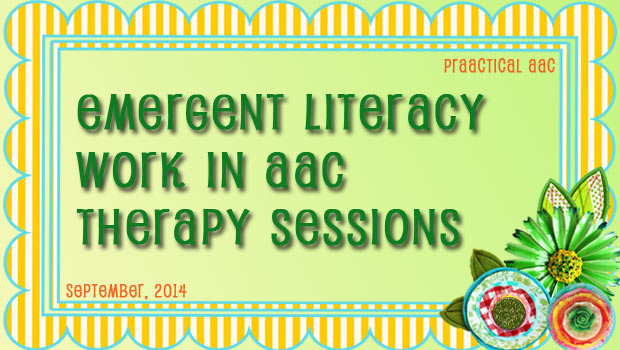
We strive to use some of our therapy time to build the literacy skills with all of our beginning communicators. It’s not easy. First, because they often have little to no interest in it (at first), but mostly because our time together is quite limited. Here are some of the things we’ve been doing. Having our clients sign in themselves (Think: name stamps, stickers, tracing, or even making a mark) Looking for their name on their therapy room door: We make signs and print two copies. We give them one in the waiting room so that they can match it to the sample on the door. Formatting the visual schedule so that the client does some writing (Think: check box, crossing off the activity when finished) Picking a book or the topic: For some of clients we use the books themselves, but for most we use their AAC. It’s time... [Read More...]
September 22, 2014
by Carole Zangari -
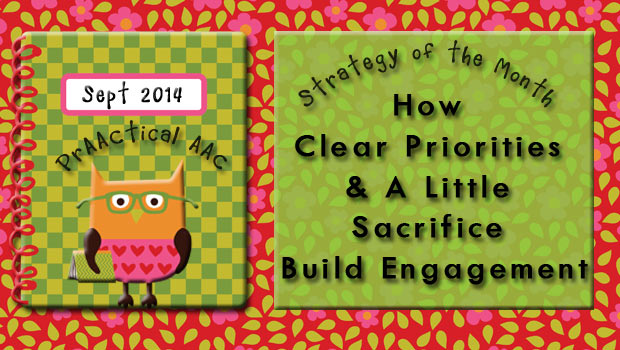
We can’t complete our thoughts on engaging AAC learners without a bit of conversation around the topic of priorities. Here’s the main idea: Go into each activity having a clear priority for what you want to achieve. Everything else become negotiable. As SLPs, sometimes we want it all. We want therapy activities where the AAC learner initiates communications, uses new vocabulary, creates novel sentences, experiments with new grammatical forms, and kicks some morphological butt. We.want.it.all. After a few decades of being an AAC practitioner, I think I’m finally learning that trying to have it all isn’t always the best option. It isn’t about what I want, it’s about what my client needs. Sigh. In this approach, we look at the lesson or activity and create our “Must Have List.’ For Mayra, a kindergartner just learning to use symbols for the first time, our lessons ‘must’ be engaging, have high pay-off... [Read More...]
July 30, 2014
by Carole Zangari -
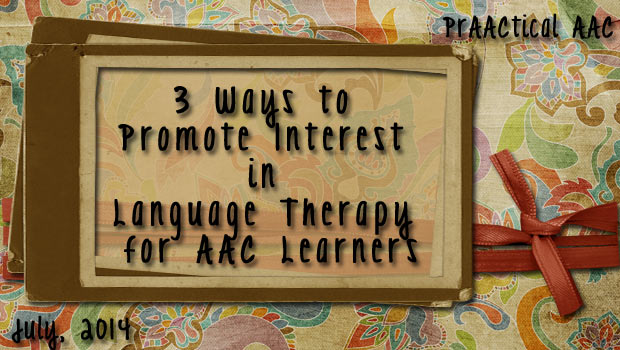
In an earlier post, we raised this question: Why work hard at something you don’t care about? The truth is that all of us put more effort into learning things that allow us to accomplish something important to US. As SLPs, we can spout many reasons why learning to use and comprehend more advanced language is a good idea. Making that meaningful to our clients, though, is another thing altogether. How can we align our therapy objectives with things of true value to our clients? Figure out what the AAC learner wants: More friends? A job? Good grades? Link the language and AAC objectives to those things. Seek the AAC learner’s input on goals and objectives: If the learner can’t nominate his/her own goals for consideration, maybe you can offer choices or help them use a rating scale to give their opinion on the suggested goals. Provide rationales for why... [Read More...]
May 18, 2014
by Carole Zangari -
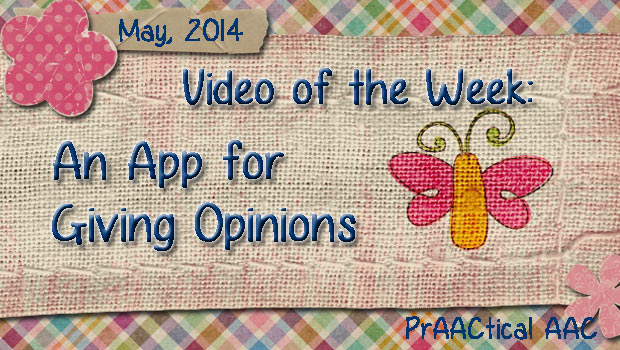
In previous posts, we’ve written about our love of rating scales as an easy way to help people with significant language challenges express their preferences. We also posted a video of that in action with a little preschooler using Talking Mats to tell whether he liked or disliked various school activities. What could be better than getting the authentic input from our prAACtical friends? Two things, actually. An e-tool for this purpose A FREE app In this post, we share two demonstrations, one with an adult client and one with a child. You can see the demo of the app here. First, take a look at James. https://www.youtube.com/watch?v=SzAgGmLYpE0 Next, let’s take a peek at Matthew: https://www.youtube.com/watch?v=GIIv17eTgFI And, last, but not least, a link to the free Talking Mats app.
March 24, 2014
by Robin Parker -
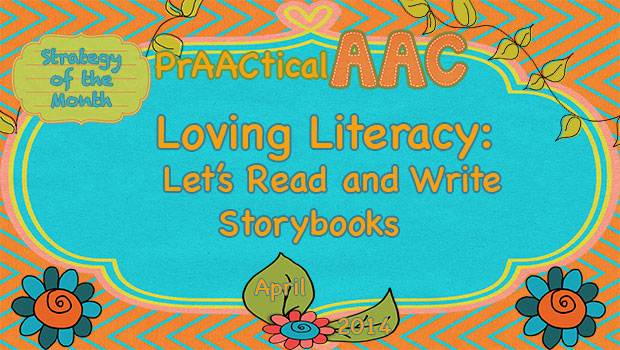
Literacy instruction involves lots of reading and writing. Last week, Carole discussed using storybook reading and the RAAP (Read, Ask, Answer, Prompt) strategy by Drs. Cathy Binger and Jennifer Kent-Walsh to teach communication and literacy. To use storybooks with all learners we need to have lots of books that are easily accessible. Books need to be accessible physically as well as through content and interest. It is lucky that with all of today’s on-line resources there is an abundance of ways to obtain as well as make and write storybooks. All learners can and should be be involved in both the reading and writing process. Not only do literacy skills improve but so do communication skills. Involving Learners in the Storybook Process Reader & Writer Vocabulary- Facilitate involvement by using reader and writer vocabulary. Refer to learners as “readers”, “authors”, “editors”, “publishers”, “critics”, etc. When you are treated and referred... [Read More...]
January 13, 2014
by Robin Parker -
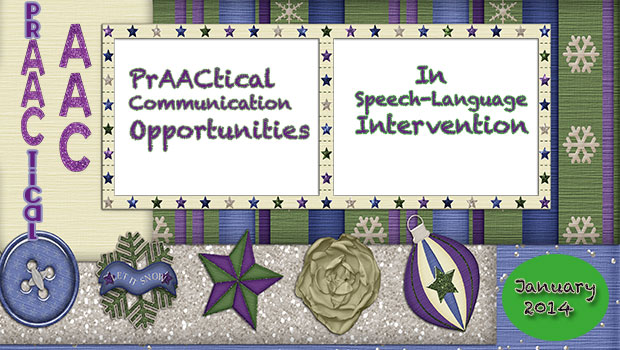
Planning for communication opportunities in every aspect of speech-language therapy helps ensure productive use of time and effort for both clinician and learner. It is not enough to talk to a student, it is not enough to provide fun activities without lots of opportunity for active participation and more specifically communication initiation. Another word for communication initiation/opportunities is communication temptations. Communication temptations are structured situations designed to entice a variety of specific communication functions or semantic relations (Wetherby, 1988). There needs to be lots of times where there is targeted modeling and then a specific, obvious reason for the learner to be the initiator of communication. A temptation to communicate. Take a look at this sample therapy session for frequent and multiple communication opportunities. Please let us know a favorite or creative communication opportunity that you use. PrAACtical Considerations Meaningful AAC Goals– All quality speech-language intervention sessions start with meaningful... [Read More...]
November 29, 2013
by Robin Parker -
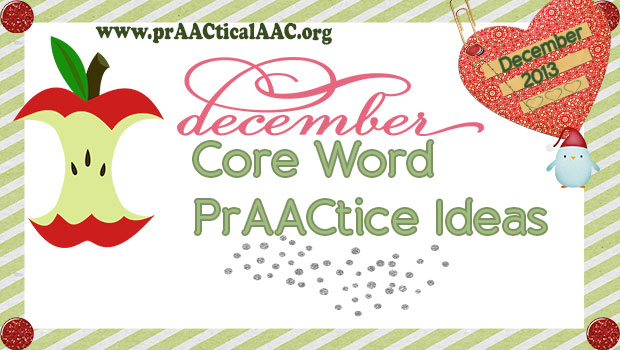
December core word prAACtice ideas are here. The best way to TEACH core words is to first provide Aided Language Input- ALI in Meaningful Language Experiences. Then give the learner a chance to be an active participant by having many (many, many) opportunities to USE the core words to request, question, complain, tell, negotiate, explain, refuse, tattle, greet, ask, vent, and discuss. There is a lot of holiday spirit this month. Here are some ideas of activities that can go with the core word words, phrases and sentences: Play Holiday Music– All holidays can be represented. Model “hear it louder”, “surprise us” for the next song, or even wear “silly hats” while singing. Cook & Eat Fun Holiday Food– As you are creating/cooking holiday treats, everyone can take a turn saying “mix it this way” or “add it this way“. Have each learner say “these next” or “please one more” or even “I want... [Read More...]
October 19, 2013
by Carole Zangari -
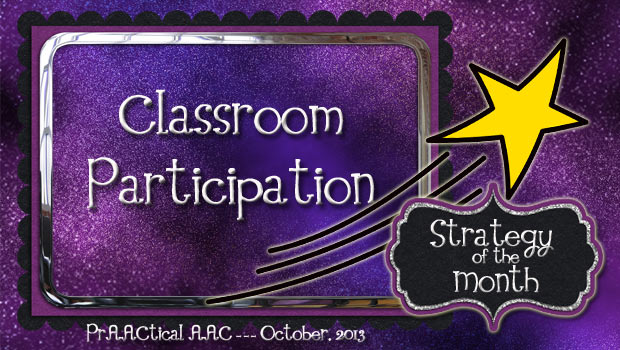
How can SLPs support students who use AAC and help them communicate more frequently in the classroom? Collaboration with the teacher is, of course, central to making this work. If you’re paired with an educator who knows, loves, and supports the AAC needs of her students, then you are in for a real treat. Collaborating with someone like that is fun and energizing. But what if your partner is new to AAC or one who doesn’t really know (or care to know) much about it? What if there is a bit of resistance to change or a passive-aggressive style? No match for a committed clinician! Ah. The ART of being an SLP. Take equal measures of creative problem-solving, wonderful pragmatics, and tenacity, and solutions will be found. In really sticky situations, we’ve seen colleagues make breakthroughs on the strength of brownies and iced coffee. You know how to make this... [Read More...]
September 12, 2013
by Robin Parker -
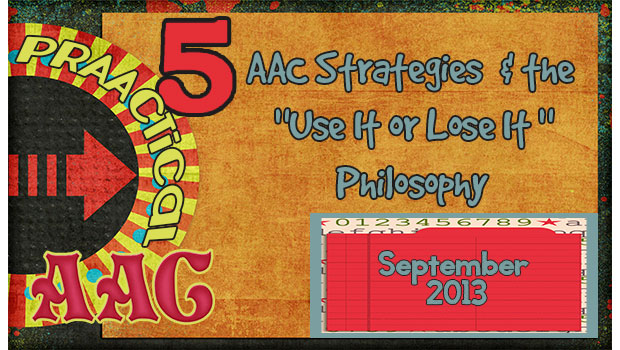
School has begun for almost everyone. Some classes have been in session for a while and routines have been formed, learning is taking place, behaviors have settled down. Now comes what can seem like the hard part: Keeping up with and expanding the strategies that helped students become successful. Instead of trying to fade AAC displays/devices and visual supports, stick with the basics and expand how they can be used. Because if you don’t use it, you may lose it. So: Keep up with: Visual Schedules– monthly, daily, and mini. Even if students know the schedule, continue to use it. Most of us would not like ‘losing’ our day planner or ‘to do’ lists even though we know our schedules. Aided Language Input First- Then Visual Support Visual Boundaries Access to a AAC Display/Device– And the display or device is with the student All the time, everywhere, charged, working, and... [Read More...]
August 30, 2013
by Robin Parker -

by Carole Zangari, originally published on August 27, 2012 “How was school?” (Good) “What did you do?” (Nothing) This scenario plays out in many cars and kitchens in the after school hours and it can be hard to know who is more frustrated: the kids for being asked or the parents for not getting satisfactory answers. And still, we repeat the process day after day. Of course, we want to know the fine details of what happened and how our children felt, but in some cases, we’d settle for ANY school-related conversation at all. I’ll be the first to admit that it took me way too long to get the hang of how to get information about my children’s school days, and it seemed like just when I did, pow! They were pre-teens and then teenagers. New rule book. Here are some ‘lessons learned’ along the way about those afterschool conversations and... [Read More...]









